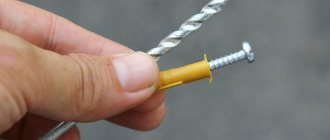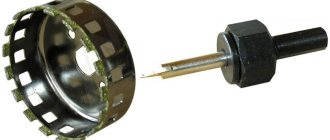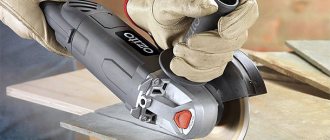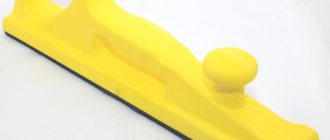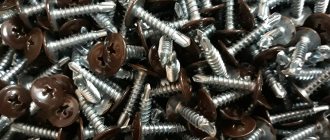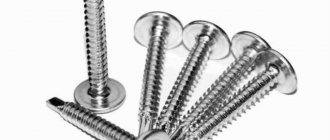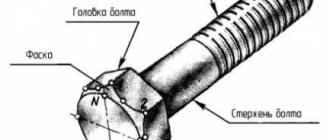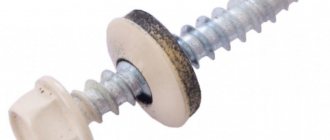Article reading time: 15 minutes
Author of the article:
One of the most common types of complex fasteners is the dowel-screw combination. It is used for fastening various parts, objects, structural elements to the surfaces of solid building materials - concrete, brick, wall blocks, natural stone. The fastening unit consists of two elements - a plastic or metal dowel, which is inserted into a hole pre-drilled in the base, and a screw, screwed into the dowel. When a screw is screwed in, the sides of the dowel expand and a frictional force arises between its outer surface and the surface of the hole walls. As a result, the fastener is securely held in the hole, withstanding significant operating loads.
Correct use of this fastening method allows you to obtain reliable connections with a long service life. One of the main conditions is the correct selection of fastening elements, which must be compatible with each other and suitable for specific conditions of use. For example, before performing work, you need to decide which screw to use for an 8 mm dowel, for a 6 mm dowel, or for another standard size used.
Material for making dowels
Most dowels are now made from polymer materials. This is due to their low cost and fairly good performance.
The main materials for the production of dowels are:
- Polyethylene. The material is easily deformed without collapsing. It is characterized by low weight and increased chemical resistance. Withstands negative temperatures down to −40 °C. The disadvantage of polyethylene is that over time it cracks and loses its performance.
- Polypropylene. It is characterized by significant hardness, resistance to wear and elevated temperatures. Due to the poor frost resistance of the material, the use of polypropylene fasteners is limited to indoor installation. During use, plugs may crack, especially when exposed to temperature changes.
- Polyamide (nylon). Plastic with increased resistance to wear and mechanical stress. The most common material for making dowels. Nylon fasteners are durable and last longer compared to fasteners made from other types of plastic.
In addition to plastic, dowels are also made of metal. They also produce fasteners made of galvanized carbon steel, stainless steel, and brass. Metal dowel fasteners have higher strength and rigidity, which allows them to withstand increased operating loads. However, metal is inferior to plastic in its ability to deform without breaking. In addition, metal dowels are significantly more expensive.
Main types of self-tapping screws
The most common types of self-tapping screws are thread-forming and thread-cutting screws. These types of fasteners allow you to cut or form threads yourself in certain types of material.
Self-drilling screws, in addition to the flute tap in the leading threads, also have a pre-drilling knurled tip, which is very similar to the tip of a drill bit. These screws combine the gripping action and actual installation of the fastener in just one drive motion (instead of separate drilling, tapping, and installation motions). Therefore, they are very effective in a variety of solid-base applications, from assembly lines to roofing. In our store the price for such screws is very attractive.
Thread forming
They can be used in plastics or materials that deform as the screw enters. If the material needs to remain tight, it is recommended to use thread-forming screws.
But don't tighten the screw too much. This can cause the material to tear if you apply too much pressure. Thread-forming screws are one of the best types of fasteners, suitable for any material that needs to be fixed.
Thread cutting
Another type of self-tapping screws that will allow you to securely fasten the necessary parts together. You can safely use them with both wooden and metal products. Although they are great for use in industrial and construction applications, there is one drawback: the threads can break when trying to disassemble the fastener. If this situation happens, you need to use slightly larger self-tapping screws to reassemble the product.
Self-tapping screws with oval head
For a finished appearance that reduces the chance of snagging on other material, these screws fit tightly into countersunk holes and have a domed head. Made from stainless steel, they are resistant to corrosion in wet and wash environments and are resistant to chemical damage. It is very easy to buy stainless steel fasteners with delivery in our online store “First Fasteners”.
Self-tapping screws create their own threads when tightened, allowing you to make a pilot hole and secure the metal in one step. All products must comply with ISO 7051, the international standard for fastener dimensions.
Stainless steel thread forming screws for thin plastic
Stainless steel self-tapping screws have good chemical resistance and can be slightly magnetic. They have a round shank and more sharply curved threads than other thread-forming screws. Therefore they require less torque and reduce the risk of cracking of thin materials such as plastic. The drive allows additional force to be applied with less slippage or damage to the recess. Length is measured from under the head.
How to choose the right dowel
To determine which dowel to choose for 8 screws, it is necessary to take into account not only the dimensional characteristics of the fastener, but also its design, which determines the scope of application of the fastener. Different types of dowel elements are produced according to their design.
The main types of dowels are:
- Polypropylene universal. When a screw is screwed in, the dowel material wraps around it. Well suited for working with various materials, including brick, concrete, natural stone.
- Universal spacer. Also made from polypropylene. It has spacers that move apart when the screw is screwed in, holding the part inside the hole.
- Nylon. Suitable for working with any materials. It is securely held in the hole with the help of special spacer antennae.
- Dowel nail. Polypropylene or nylon plug with steel driving nail. Allows you to quickly fasten profile elements, sheathing, sheet and slab materials.
- For drywall. Can be made of plastic or metal. Metal elements do not require pre-drilling for installation.
- Butterfly dowel. Also used for installation in drywall and various hollow materials.
- Dowel-umbrella (fungus). It has a round cap of significant diameter with perforation. It is used for covering walls with heat-insulating materials - polystyrene foam, mineral wool, etc.
- Adjustment. Used for installation of sheathing structures. The design of the fastening element provides the possibility of adjustment - adjusting the height of the fastening relative to the surface of the base.
- Dowel clamp. It is made of nylon, in the form of a loop with elongated legs that are inserted into the mounting hole. Used for open cable laying along the surface of a wall or floor slab.
When completing the assembly assembly, it is necessary to select the diameter and length of both the dowel and the self-tapping screw, as well as the depth of the hole to be drilled. First of all, the dowel is selected according to diameter and length. The larger the part size, the greater the load the fastener can withstand. For light loads, you can use clamps of small diameters - 4 mm and 5 mm. Dowels with a diameter of 6 mm, 8 mm are suitable for medium loads, with a diameter of 1 mm and 12 mm can be used for significant operating loads. For heavily loaded mounting units, dowel elements with a diameter of 14 mm and 16 mm are used.
In addition, you need to choose which drill to drill the mounting hole with. The drill is selected in accordance with the standard size of the dowel - their numbers must match. It is important that the plug fits tightly enough into the hole in order to ensure reliable fastening and prevent the dowel from twisting and falling out. When making large-diameter holes in concrete, brick and other materials, it is recommended to initially work with a drill of a smaller diameter in impact mode. After this, the hole is drilled to the required diameter using a standard-size drill without impact mode.
Installation of objects with significant weight
To fasten heavy objects (furniture cabinets, shelves, TV stands, etc.), you must choose a dowel, also of the impact type. In this case, the diameter of such a dowel, as well as the transverse size of the drill, must be at least 10 mm. Such dowels are buried 6 cm into the walls, and 8 cm into the ceiling. For reliable fastening of heavy objects, as a rule, at least 6 dowels are used.
To fasten the horizontal bar and ladder, anchor bolts are used, the diameter of which must be at least 8 mm. Such bolts are buried 6 cm into the surface of the walls, and 8 cm into the ceiling.
The procedure for installing an anchor in a concrete wall
Types of anchor bolts
Anchor bolts used to secure various objects are divided into three main types:
- anchor bolts with a nut, which, after installing the fastener, is tightened with a spanner or open-end wrench (with the help of such bolts, hidden fasteners are performed);
- anchor bolts with a self-locking nut, which is tightened using a Phillips-type screwdriver (such bolts can be used for fastening in places that are visible);
- double-expansion anchor bolts are the most reliable fasteners that are used to fix even very heavy objects.
Main types of anchors
Classification of screws
The correct selection of screws is key to forming a reliable and stable connection. For installation, as a rule, screws or self-tapping screws with a countersunk, semi-countersunk head are used. Less commonly used are hardware with a semicircular or hexagonal head. The type of head is selected based on the type and design features of the parts fixed to the surface of the base. The key parameter when choosing is the diameter of the screw, which is selected depending on the diameter of the dowel element. If you choose smaller hardware, it will not be able to sufficiently open the dowel when screwing it in, which will not allow you to create a reliable connection. A self-tapping screw that is too thick simply cannot be screwed in.
The selection of diameters is carried out as follows:
- For a 4 mm dowel element - a 2 mm screw.
- For a 5 mm dowel - a self-tapping screw from 2 mm to 3 mm.
- For a 6 mm dowel - a self-tapping screw from 3.5 mm to 4.5 mm.
- An 8 mm dowel accepts a screw from 4.5 mm to 5.5 mm.
- Dowel 10 requires a screw from 5.5 mm to 6.5 mm.
- For a 12 mm dowel - a screw from 6.5 mm to 8.5 mm.
- For 14 mm dowels, select a self-tapping screw with a diameter from 0.5 mm to 10.5 mm.
- For dowel elements with a diameter of 16 mm, self-tapping screws with a diameter of 10.5 mm to 12.5 mm are used.
It is important to choose the length of the self-tapping screw to be installed. When screwing in hardware that is not long enough, the dowel will not open completely. As a result, it will not be securely fixed in the mounting hole and will rotate. In this case, the connection will not be reliable and will not withstand operating loads. To select the correct size, you need to take the length of the dowel being installed and add to it the thickness of the attached part. The result is the minimum required screw length. It may be larger, but in this case it is important to drill the hole to the appropriate depth. It is necessary to take into account the restrictions on the thickness of the attached parts depending on. When installing on a solid base, this size should not be more than 60% of the dowel length. When working on loose bases, the limit is 35%.
Securing medium weight items
Fixing objects of average weight is performed using impact-type dowels. In this case, the transverse dimensions of the dowels, as well as the corresponding drills, must be at least 8 mm. The dowel chosen for these purposes must go into the wall to a depth of at least 6 cm, and when attached to the ceiling surface - to a depth of 8 cm. To securely fasten an object of average weight (up to 10 kg) to the wall or ceiling, you must use 4 dowels at the same time.
It is convenient to hang medium-weight objects on quick-installation dowels if the design allows the use of through fastening
Dowel selection table
A special table will help you choose the right screw for a dowel of a certain size and determine the required parameters of the mounting hole.
| Screw dimensions | Dowel dimensions | Hole dimensions | |||
| Diameter, mm | Length, mm | Diameter, mm | Length, mm | Drill diameter, mm | Drilling depth, mm |
| 3 | 12, 16, 20, 25, 30, 35, 40 | 5 | 12, 16, 20, 25, 30, 35, 40 | 5 | 16, 20, 25, 30, 35, 40, 45 |
| 3,5 | 12, 16, 20, 25, 30, 35, 40, 45, 50 | 6 | 12, 16, 20, 25, 30, 35, 40, 45, 50 | 6 | 16, 20, 25, 30, 35, 40, 45, 50, 55 |
| 4 | 12, 16, 20, 25, 30, 35, 40, 45, 50, 60, 70 | 5 or 6 | 12, 16, 20, 25, 30, 35, 40, 45, 50, 60, 70 | 5 or 6 | 16, 20, 25, 30, 35, 40, 45, 50, 55, 65, 75 |
| 4,5 | 16, 20, 25, 30, 35, 40, 45, 50, 60, 70, 80 | 6 or 8 | 16, 20, 25, 30, 35, 40, 45, 50, 60, 70, 80 | 6 or 8 | 20, 25, 30, 35, 40, 45, 50, 55, 65, 75, 85 |
| 5 | 20, 25, 30, 35, 40, 45, 50, 60, 70, 80, 90, 100 | 6 or 8 | 16, 20, 25, 30, 35, 40, 45, 50, 60, 70, 80, 90, 100 | 6 or 8 | 20, 25, 30, 35, 40, 45, 50, 55, 65, 75, 85, 95, 105 |
| 6 | 40, 45, 50, 60, 70, 80, 90, 100, 120, 140, 160, 180, 200 | 8 or 10 | 40, 45, 50, 60, 70, 80, 90, 100, 120, 140, 160, 180, 200 | 8 or 10 | 45, 50, 55, 65, 75, 85, 95, 105, 130, 150, 170, 190, 220 |
| 8 | 40, 45, 50, 60, 70, 80, 90, 100, 120, 140, 160, 180, 200 | 10 or 12 or 14 | 40, 45, 50, 60, 70, 80, 90, 100, 120, 140, 160, 180, 200 | 10 or 12 or 14 | 45, 50, 55, 65, 75, 85, 95, 105, 130, 150, 170, 190, 220 |
| 10 | 40, 45, 50, 60, 70, 80, 90, 100, 120, 140, 160, 180, 200, 220, 240, 260 | 12 or 14 | 40, 45, 50, 60, 70, 80, 90, 100, 120, 140, 160, 180, 200, 220, 240, 260 | 12 or 14 | 45, 50, 55, 65, 75, 85, 95, 105, 130, 150, 170, 190, 220, 230, 260, 280 |
Using self-tapping screws with plastic and wood
Regular self-tapping screws are suitable for use with most plastics. But there may be screws for plastic that have more pointed threads, which further increases resistance. They may be exposed in low density plastics.
Thread-forming screws are widely used in plastic housings. These are self-tapping screws that do not cut threads with the sharp end. But they push the threads inward, deforming the material. Therefore, it is vital to use thread forming screws in more flexible materials such as plastic.
When working with wood, it is highly advisable to make a test hole in hardwood. This will limit the splitting that may occur due to damage caused within the wood. If you use self-tapping screws in wood, you need to make sure that the characteristics of the fasteners used are taken into account. It is better to use types of fasteners that are resistant to corrosion, such as stainless steel. Wood absorbs moisture over time, and the screws can rust.
In the First Fastener store you can buy screws in bulk, the price will be very favorable. Here you will find the best selection of self-tapping screws and dowels for any purpose. And also, if necessary, our consultants will guide you on prices, tell you about the features of the product you are interested in, and answer any questions. Call toll-free 8-800-201-81-96 for more details.
Conclusions on the topic
Today we looked at the topic of choosing a dowel for a self-tapping screw - a topic on which the strength of your fixed shelf, cabinet, etc. depends. It is worth understanding that repairs consist of little things. A couple of incorrectly selected screws are enough for something to eventually break. Approach the choice of these little things with all seriousness and responsibility.
If after reading the article you still have questions, just write to us in the comments and we will try to answer them. Niche authors constantly monitor all comments and respond to them if necessary.
Source
